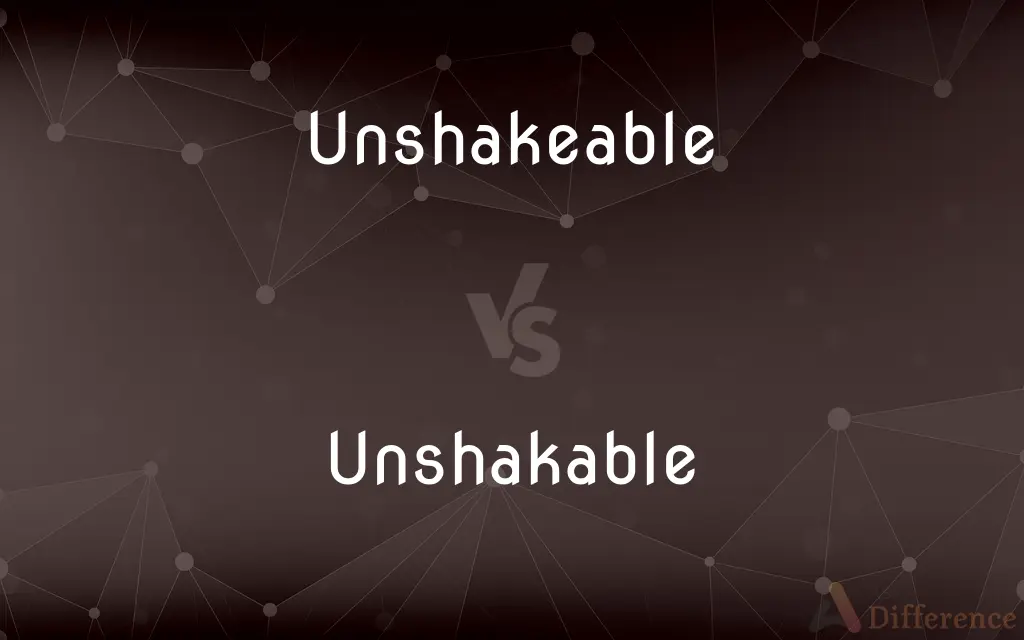Unshakeable vs. Unshakable — What's the Difference?
Edited by Tayyaba Rehman — By Urooj Arif — Updated on April 6, 2024
Unshakeable emphasizes unwavering confidence or belief, while unshakable often refers to physical stability or firmness.

Difference Between Unshakeable and Unshakable
Table of Contents
ADVERTISEMENT
Key Differences
Unshakeable generally conveys a sense of profound steadfastness or unyielding belief, often in the context of one's faith, confidence, or resolve. It suggests a deep-rooted, unchangeable nature that is immune to doubt or fear. Unshakable, while similar, is frequently used to describe something or someone that cannot be physically moved, disturbed, or undermined. It implies a level of stability and solidity that cannot be altered by external forces.
The choice between unshakeable and unshakable often hinges on the nature of what is being described. Unshakeable is typically applied to intangible qualities, such as beliefs or feelings, indicating that they cannot be weakened or removed. For example, someone might have an unshakeable faith in a higher power or an unshakeable commitment to a cause. On the other hand, unshakable might be used to describe physical objects or situations that cannot be literally shaken or moved, highlighting their firmness and stability.
Although the meanings of unshakeable and unshakable are closely aligned, the subtle differences in their usage can convey varying degrees of metaphorical or literal steadfastness. Unshakeable might suggest a more emotional or psychological form of resilience, a trait of character or mind that remains steady despite challenges. Conversely, unshakable can evoke images of physical immovability, such as a building designed to withstand earthquakes or a stance that cannot be knocked over.
The preference for unshakeable over unshakable (or vice versa) can also reflect regional or stylistic language variations. While both spellings are correct and understood in all English-speaking regions, usage trends might slightly favor one spelling over the other depending on the country or the context in which it is used.
While unshakeable and unshakable share a core meaning related to the concept of being unable to be moved or altered, their nuances and applications can differ based on whether the focus is on metaphorical, emotional, and psychological stability (unshakeable) or on literal, physical, and tangible solidity (unshakable). The choice between them often depends on the speaker or writer's intent and the specific qualities they wish to highlight.
ADVERTISEMENT
Comparison Chart
Definition
Firmly fixed; cannot be undermined or weakened.
Not able to be physically shaken or moved.
Usage in Sentence
Often used to describe beliefs, convictions, or emotional stability.
Commonly refers to physical stability or robustness.
Emotional Connotation
Carries a more emotional or psychological weight.
Less about emotion, more about physical or structural firmness.
Examples
Unshakeable faith, confidence, resolve.
Unshakable foundations, stance, determination.
Preferred Context
More abstract or philosophical discussions.
More practical, physical, or tangible contexts.
Compare with Definitions
Unshakeable
Not affected by external forces or criticism.
The leader's unshakeable confidence inspired his followers.
Unshakable
Solid or stable in structure.
The building's unshakable foundations ensured its longevity.
Unshakeable
Remaining strong and steady in the face of challenges.
Despite the setbacks, her unshakeable optimism never wavered.
Unshakable
Firmly established and not subject to change.
The monument stood as an unshakable symbol of the city's resilience.
Unshakeable
Incapable of being doubted or questioned.
Her unshakeable belief in justice drove her to pursue a career in law.
Unshakable
Unwavering; not to be altered or swayed by outside forces.
His unshakable determination was apparent in every action he took.
Unshakeable
Unyielding in determination or commitment.
He showed unshakeable dedication to his fitness regimen.
Unshakable
Indisputable; cannot be questioned.
The evidence presented in the case was unshakable.
Unshakeable
Not susceptible to change or variation.
His unshakeable focus on the goal helped the team win the championship.
Unshakable
Not capable of being physically shaken or moved.
The table's unshakable design prevented it from toppling over during the earthquake.
Unshakeable
"Unshakeable" is an electronic rock single by Celldweller from Wish Upon a Blackstar, it is the second single from the album, and the second Celldweller song to receive airplay (the other being "I Believe You"), the radio edit was released free through Alternative Press and SoundCloud on May 15, 2012."Unshakeable" was later remixed by BT and Seamless, and was released as its own single on October 22, 2013.
Unshakable
Incapable of being shaken
Unshakable faith.
Unshakeable
Alternative form of unshakable
Unshakable
Not able to be shaken; firm, solid
Unshakable
Resolute, unfaltering, unwavering
Unshakable
(figuratively) Having no errors or loopholes; unassailable
Unshakable
Not capable of being shaken; firm; fixed.
Unshakable
Marked by firm determination or resolution; not shakable;
Firm convictions
A firm mouth
Steadfast resolve
A man of unbendable perseverence
Unwavering loyalty
Unshakable
Without flaws or loopholes;
An ironclad contract
A watertight alibi
A bulletproof argument
Common Curiosities
Does unshakable imply a physical immovability?
Yes, unshakable often implies physical stability or immovability, like a structure that cannot be physically shaken.
Can unshakeable and unshakable be used interchangeably?
Yes, they can be used interchangeably, though subtle nuances might make one more appropriate depending on the context.
Is unshakeable used more in abstract contexts?
Yes, unshakeable is more commonly used in abstract or philosophical contexts.
Is unshakeable more about beliefs than physical states?
Yes, unshakeable is often used to describe firm beliefs or convictions that are not easily undermined.
Can unshakable be used to describe someone's stance on an issue?
Yes, someone's stance on an issue can be described as unshakable, indicating firmness and conviction.
What is the main difference between unshakeable and unshakable?
Unshakeable often refers to emotional or psychological steadiness, while unshakable typically describes physical stability.
What makes something unshakable in a physical sense?
In a physical sense, something is unshakable if it is constructed or established in a manner that prevents it from being moved or shaken by external forces.
Is there a preferred spelling between unshakeable and unshakable?
No, there is no universally preferred spelling; the choice can depend on regional preferences or the specific context.
Are both terms used in both British and American English?
Yes, both terms are used in British and American English, with no significant difference in meaning.
Can a person's determination be described as unshakeable?
Yes, a person's determination can be described as unshakeable, indicating a steadfast commitment.
Can the foundation of a building be unshakable?
Yes, the foundation of a building can be described as unshakable, indicating it is stable and secure.
Can confidence be considered unshakeable?
Yes, confidence can be considered unshakeable when it is strong and unwavering.
Is unshakeable confidence a positive trait?
Yes, unshakeable confidence is generally viewed as a positive trait, reflecting strength of character and resilience.
Share Your Discovery

Previous Comparison
Colocated vs. Collocated
Next Comparison
Freezer vs. ChillerAuthor Spotlight
Written by
Urooj ArifUrooj is a skilled content writer at Ask Difference, known for her exceptional ability to simplify complex topics into engaging and informative content. With a passion for research and a flair for clear, concise writing, she consistently delivers articles that resonate with our diverse audience.
Edited by
Tayyaba RehmanTayyaba Rehman is a distinguished writer, currently serving as a primary contributor to askdifference.com. As a researcher in semantics and etymology, Tayyaba's passion for the complexity of languages and their distinctions has found a perfect home on the platform. Tayyaba delves into the intricacies of language, distinguishing between commonly confused words and phrases, thereby providing clarity for readers worldwide.














































